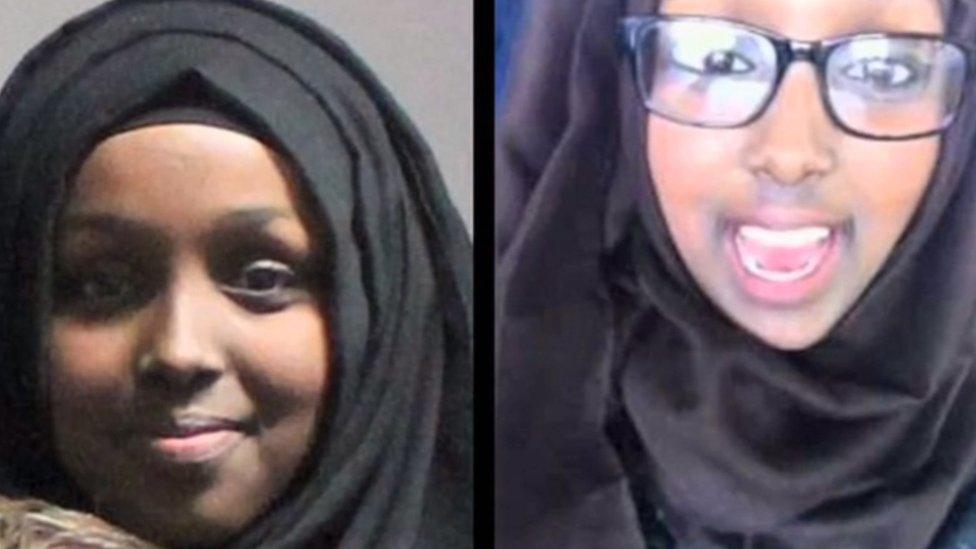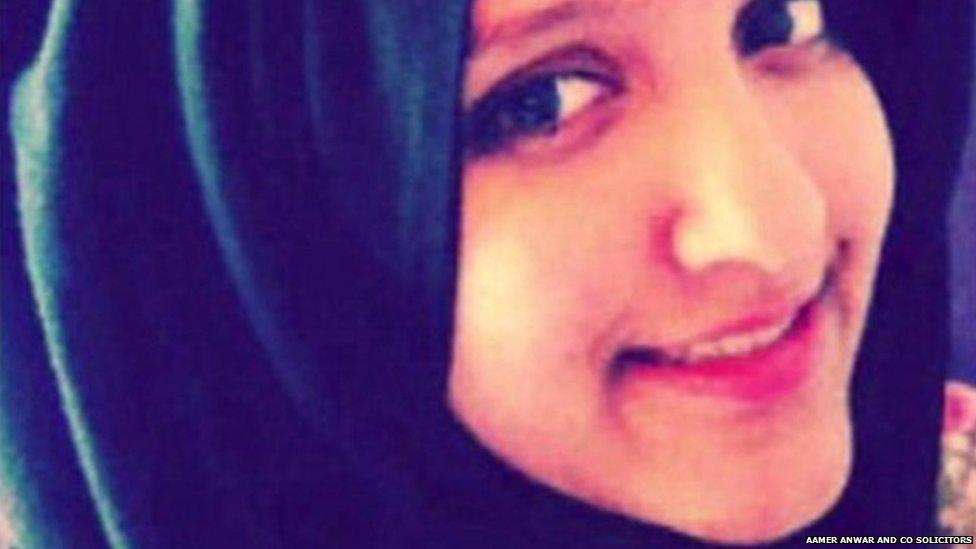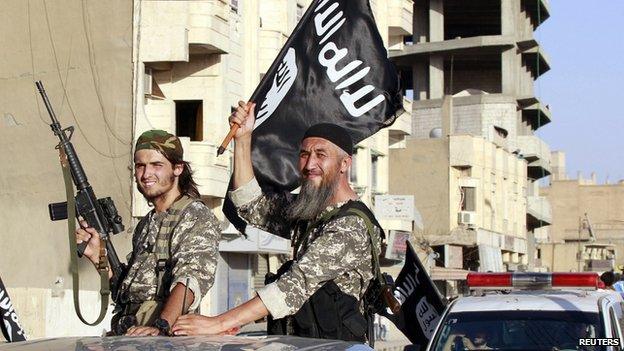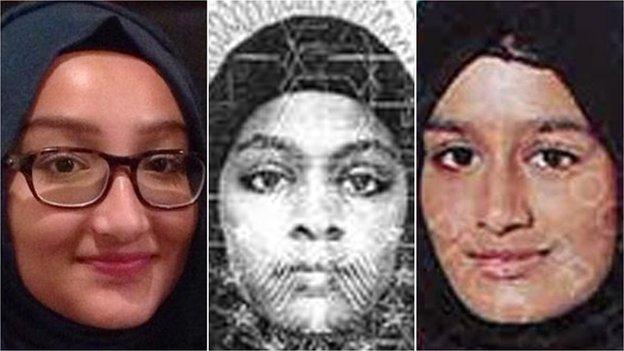The crucial role of women within Islamic State
- Published

Manchester twins Zahra and Salma Halane travelled to join IS in 2014; they both married IS fighters but were widowed by the end of the year
Whitehall officials have told the BBC that contrary to recent announcements, the number of Britons emigrating to Syria to live under Islamic State (IS) rule peaked two years ago. However, the proportion of women among those joining the extremist group has risen dramatically. So what's behind this and what exactly is the IS strategy behind luring women into their ranks? Our Security Correspondent Frank Gardner investigates.
Islamic State, also known as Isis, has a dual attitude to women.
On the one hand it treats those it considers heretics as almost sub-human, as commodities to be traded and given away as rewards to jihadist fighters.
Shocking footage from a modern-day sex-slave market in Mosul, Iraq, shows militants discussing prices for Yazidi girls, captured last year, many of them underage.
At least 2,000 Yazidi women are still being held, only a few have escaped.
'Corner stones'
"They put us up for sale," said one who did recently escape. "Many groups of fighters came to buy. Whatever we did, crying, begging, made no difference."

Aqsa Mahmood left Glasgow in 2013 to marry an IS fighter in Syria
But on the other hand, IS has big plans for Muslim women who migrate to their territory to play a key role in building the so-called caliphate.
"They want women to join them," says Dr Katherine Brown, an expert in Islamic Studies at King's College London.
"They see women as the corner stones of the new state and they want citizens.
"What is really interesting is that people talk of IS as being a death cult, but that is the opposite of what they are trying to create... they want to create a new state... and they very much want women to join that as part of this utopian politics."
That utopia includes a treatise published in Arabic in February, setting out a code of conduct that harks back 1,400 years.
It is aimed primarily at Arab women in the Gulf states and the wider Middle East and includes passages that are incomprehensible to most people in the West:
"It is considered legitimate for a girl to be married at the age of nine. Most pure girls will be married by 16 or 17, while they are still young and active," the treatise says.
Putting down roots

In June 2014, Isis fighters celebrated their declaration of a caliphate with a rally in Raqqa
A former al-Qaeda member with a deep insight into the jihadist mindset is Aimen Deen. He believes the IS approach to women is very different from that of al-Qaeda or the Taliban.
'Unlike al-Qaeda, Isis is looking to establish a permanent society with roots. They are bringing families from the entire Muslim world, not just from Europe and the US but from Central Asia... providing families for the Islamic State."
Online recruitment messages are pumped out continually, in different languages, telling Muslims to abandon their safe but conflicted lives in the West and come to the caliphate.
Ignored by the vast majority, there are nevertheless a growing number of women heeding the call.
Some are like the British girls from Bethnal Green in east London, who wanted to be jihadist brides, marrying a fighter who will give them status.
"There is a romantic element here," continues Aimen Deen, who warns that it can often end in tragedy.
"The life expectancy of a jihadist is a month or two. So what will happen is that a woman will marry someone, he will die and for four months and 10 days she will be in mourning.
"If she is pregnant then maybe longer, and then she will marry someone else and then there will be another martyred husband, another four months in mourning and she will go through this process again.
"That is not a happy life, that is a miserable one."

Kadiza Sultana, Amira Abase and Shamima Begum flew via Turkey to Syria in February
Social media role
But unlike the Taliban or al-Qaeda, IS have allowed many of their western female recruits a prominent public role on social media.
Perhaps the best known is the 20-year-old Glaswegian runaway, Aqsa Mahmoud, who calls herself "Umm Laith".
She has become famous for dispensing advice to women thinking of abandoning their families in Britain, from the mundane to the philosophical.
Mah-Rukh Ali, a Norwegian researcher at Oxford University who specialises in women and propaganda in IS, believes it is a deliberate strategy to give women a prominent role online.
"Isis uses women much more actively than we ever saw the Taliban or al-Qaeda using them," she says.
"There are about 100,000 pro-Isis tweets every day and many of these tweets appear to come from women who have joined Isis from western societies."
Researchers say that many of those women who make it across the Turkish border into IS-controlled territory end up frustrated by the roles they are assigned.
Unmarried women are kept in a safe house, usually with others who speak their language and given religious indoctrination and Arabic classes while a husband is found for them as quickly as possible.
Any thoughts of taking part in battles and wielding a Kalashnikov on the frontline are soon dashed. But some join the Khansaa Brigades, a women-only vigilante force that patrols cities like Raqqa and Mosul enforcing strict Islamist rules.
"They've been known to carry out harsh punishments like beatings and whipping someone for not wearing the right clothing," says Dr Katherine Brown.
They have also been known to put animal trap clamps on a women's breasts because they have been breastfeeding in public, she says.
But beyond the cruelty and the shocking practices that have propelled IS to international infamy, the uncomfortable fact is that their so-called caliphate is not going away.
I asked Aimen Deen, the former jihadist, if IS now sees women as essential to the group's chances of survival.
"Indeed, there is no question about it. They are half of the society. They are playing an important role in many departments: the medical department, the educational department and even the tax collection department, so they are essential for the survival of Islamic State."